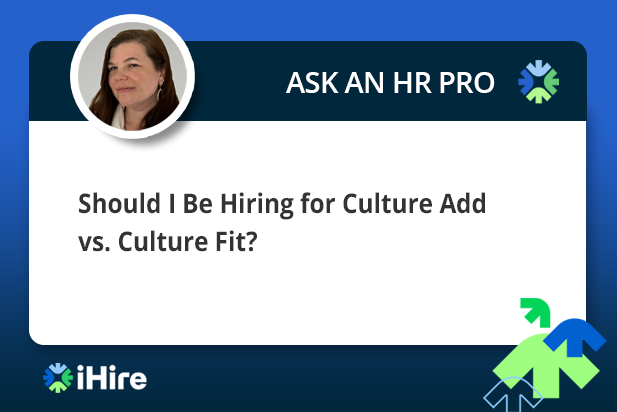- Employer Resources
- |
- Last Updated: May 26, 2022

Ask an HR Pro: Should I Be Hiring for Culture Add vs. Culture Fit?
Over the past few years, hiring for “culture fit” has become very popular with employers. It’s easy to understand why: Theoretically, if everyone gets along and has the same way of thinking and solving problems, then the company will be more efficient, and it will be an enjoyable place to work. This isn’t necessarily wrong, but there are some hidden downsides to hiring only for culture fit. What if you want to innovate? If everyone thinks the same, it’s going to be difficult to come up with new ideas. And can you truly say you encourage DEI initiatives if you’re specifically choosing hires based on how well they fit in?
This is why the philosophy of hiring for “culture add” is starting to emerge. But should you consider adopting this new way of hiring? And how do you even begin to shift your hiring focus? In this month’s Ask an HR Pro, we talked with Vickie Krolak, iHire HR Consultant, to determine why you should consider hiring for culture add vs. culture fit and how you can ensure your efforts succeed.

What is Culture Add vs. Culture Fit?
At its core, hiring for culture fit is about making sure new hires and current employees mesh well together and get along both in personality and values. It’s a fine notion, but it can lead to some blind spots. Meanwhile, hiring for culture add is about expanding on what you have to increase diversity, creativity, and innovation. It’s a different philosophy that encourages growth, not complacency.
“Look for candidates that will bring new, fresh, and different ideas and experiences to their team and are more likely to add something the team may be lacking,” Krolak said. “Employees with novel perspectives provide unique ideas and drive innovation. They challenge the status quo and inspire team members to develop new products or services your company can offer.”
This isn’t to say you should ignore how a candidate will (or won’t) get along with the current team – that’s still important for employee satisfaction. However, it shouldn’t be the only focus when considering how the potential new hire will relate to your company’s culture.
“There needs to be a shift in your mindset when it comes to culture fit,” Krolak continued. “Think of culture fit as ‘does the candidate value the same core values as the company,’ not ‘do they fit in with the team.’”
How to Change Your Mindset to Culture Add
To fully embrace hiring for culture add, Krolak said that your first step should be to take a look at your company’s core values:
“Make inclusion and growth part of your core values. They will reinforce your intent in your hiring practices.”
Once you’re committed to growth and inclusion at your company, you need to make sure your managers and hiring staff are in alignment. When they understand the reasoning and importance behind culture add in addition to culture fit, they’ll carry the philosophy throughout the hiring process.
“Train your managers on culture add, what it means, and how to hire for it,” Krolak recommended. “Remind the hiring manager that there needs to be a balance of culture fit and culture add. Evaluate applicants based on the distinctive talent and perspective they bring or add to your company.”
Create Your Account Today to Get More Hiring Advice
Sample Culture Add Interview Questions
The interview portion of the hiring process is your best chance to determine what a candidate can add to your company. You should still ask questions that measure a candidate’s proficiency at their duties, of course, but you should also put your culture add practices to the test. So, what kind of interview questions are best?
“Focus this part of your interview on behavior-based, culture add questions that speak to the company’s core values and are job-specific,” Krolak advised.
Krolak provided a few sample culture add interview questions you can ask:
- How do your coworkers benefit from working with you specifically? This will help you determine what it’s like to work with them.
- Tell me about a time you made a mistake. Look for accountability for their actions and how they fixed what went wrong.
- Tell me about a time when understanding someone else’s viewpoint helped you overcome or resolve an issue. How do they work with others and overcome differing opinions?
- Tell me about a time when you disagreed with your manager. Like the previous question, this one gives you more insight into how they ensure their viewpoints are understood.
- Tell me about yourself. You’ve probably asked this common question before, but remember, you’re not looking for similarities this time.
Shifting to a philosophy of hiring for culture add won’t happen overnight, but if you continue to practice it, your company will be better prepared for the future. For more answers to your HR questions, check out our Employer Resource Center.

Originally Published: May 26, 2022




